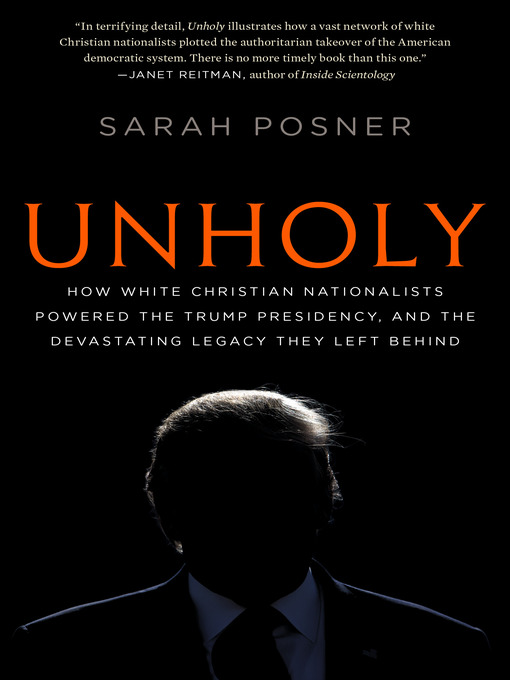
Unholy
Why White Evangelicals Worship at the Altar of Donald Trump
کتاب های مرتبط
- اطلاعات
- نقد و بررسی
- دیدگاه کاربران
نقد و بررسی

March 1, 2020
An examination of the historical reasons for Donald Trump's appeal to white evangelical voters. Journalist Posner, a reporter for Type Investigations who has written for Rolling Stone, the Washington Post, and other outlets, looks back through five decades of evangelical activity to ascertain why white evangelical voters would support Trump, who has repeatedly shown himself to be biblically illiterate and morally bankrupt. "They had been waiting for a leader unbowed," writes the author, "one who wasn't afraid to attack, head-on, the legal, social, and cultural changes that had unleashed the racist grievances of the American right, beginning with Brown v. Board of Education." Throughout the book, Posner characterizes the Christian right as undeniably racist, steeped in a generational disdain for civil rights and secretly longing for an age of white dominance. As the author argues in mostly convincing fashion, because Trump embodies these same worldviews and despite his questionable Christian credentials, he is closely connected to Christian right voters. Posner takes pains to draw connections from early, sometimes obscure figures in evangelical politics--e.g., activist Paul Weyrich and strategist Arthur Finkelstein--to a wide constellation of Trump supporters and others pushing radical agendas. She shows how white evangelicals continue to fight against the changes brought about by desegregation, affirmative action, women's rights, and LGBTQ rights. Posner's discussions of American ties to Hungary's right-wing government, as well as Moldova as a center of worldwide far-right activity, require more research and context to lift them above the level of conspiracy theory. Posner's passionate antipathy for Trump, the "pagan king," is consistently palpable, as is her disdain for conservatives in general. Though she makes many solid points about Trump's racist, xenophobic, and misogynistic actions, most of these are already well-covered elsewhere. For a deeper dive into American evangelicalism that explains Trump's appeal in a more organic, less headline-grabbing fashion, try Frances FitzGerald's The Evangelicals. More grist for anti-Trump readers that could serve as an entry point for further investigations of political evangelicalism.
COPYRIGHT(2020) Kirkus Reviews, ALL RIGHTS RESERVED.

March 30, 2020
Posner (God’s Profits), reporting fellow at Type Investigations, reveals in this trenchant study the modern white religious right as a group anxious about losing power in a changing country and determined to rebuild America with white Christians at its center. To many observers, Posner writes, white evangelicals’ support for Donald Trump is mysterious: after decades of championing moral values in politics, why would they back a liar and adulterer with no history of religious observance? Her answer is straightforward: evangelicals overlooked his less savory characteristics because he was committed to white Christian nationalism. This broader historical view posits that Trump is not an aberration but a fulfillment of 40 years of organized political strategy, and that many of his actions while in office—admiring foreign dictators, promoting views based in far-right extremism—are mirrored in the history of the American religious right. While Posner can get bogged down in the details, as in her meticulous debunking of the notion that Christian nationalism arose in opposition to abortion, overall she is convincing. Posner’s authoritative investigation will be a must-read for those interested in the connections between the Trump presidency and evangelicalism.

Starred review from April 1, 2020
When white evangelicals handed Donald Trump an electoral college victory in the 2016 presidential race, many observers were baffled by the seeming incongruous alliance between conservative Christians who spoke of "family values" and a crass, bullying showman with a long history of transgressive behavior. Yet, journalist Posner (God's Profits), longtime analyst of the religious right, argues that Trump "was the strongman the Christian right had long been waiting for." Not himself a godly man, Trump was a man through whom God would act, aggressively restoring white Christian evangelicals to their rightful place as autocratic leaders of a wayward nation. Posner's narrative begins with the sense of displacement and racial grievance white Christian conservatives experienced following Brown v. Board of Education (1954) and traces the development of the religious right's political infrastructure up until the Obama presidency, demonstrating how decades of patient strategizing created an environment in which Trump, the perfect televangelist candidate, could take center stage as the visible leader of a Republican Party prepared to pursue an agenda of wholesale assault on pluralist democracy in the name of redeeming white Christian America. VERDICT Highly recommended for those seeking to understand how white evangelicals developed political power.--Anna J. Clutterbuck-Cook, Massachusetts Historical Soc., Boston
Copyright 2020 Library Journal, LLC Used with permission.

April 15, 2020
The 2016 election left many people stunned, especially because evangelical voters embraced Donald Trump, who, on the surface, seems diametrically opposed to religious values. Also puzzling is the continued support for Trump, but as journalist Posner (God's Profits, 2008) explains, this president employs tactics similar to those of televangelists. Posner shows how conservative politics have shifted since the 1970s, with the line between church and state blurring as conservative Christians gained steady influence in government. Her extensive research offers a dizzying array of right-wing think tanks and coalitions, driven by both high- and low-profile names; it can be hard to keep them straight. Add abortion, immigration issues, blatant racism, and extremist alt-right views about same, and one has the stew that is the current political scene. Posner reckons that Trump is merely "a catalyst, not a cause," capitalizing on racial fear, economic uncertainty, and social unrest; he and his followers cast "progressive government action as the enemy of Christian freedom." She sees no end in sight, nor does she offer easy answers. A gripping read.(Reprinted with permission of Booklist, copyright 2020, American Library Association.)

























دیدگاه کاربران